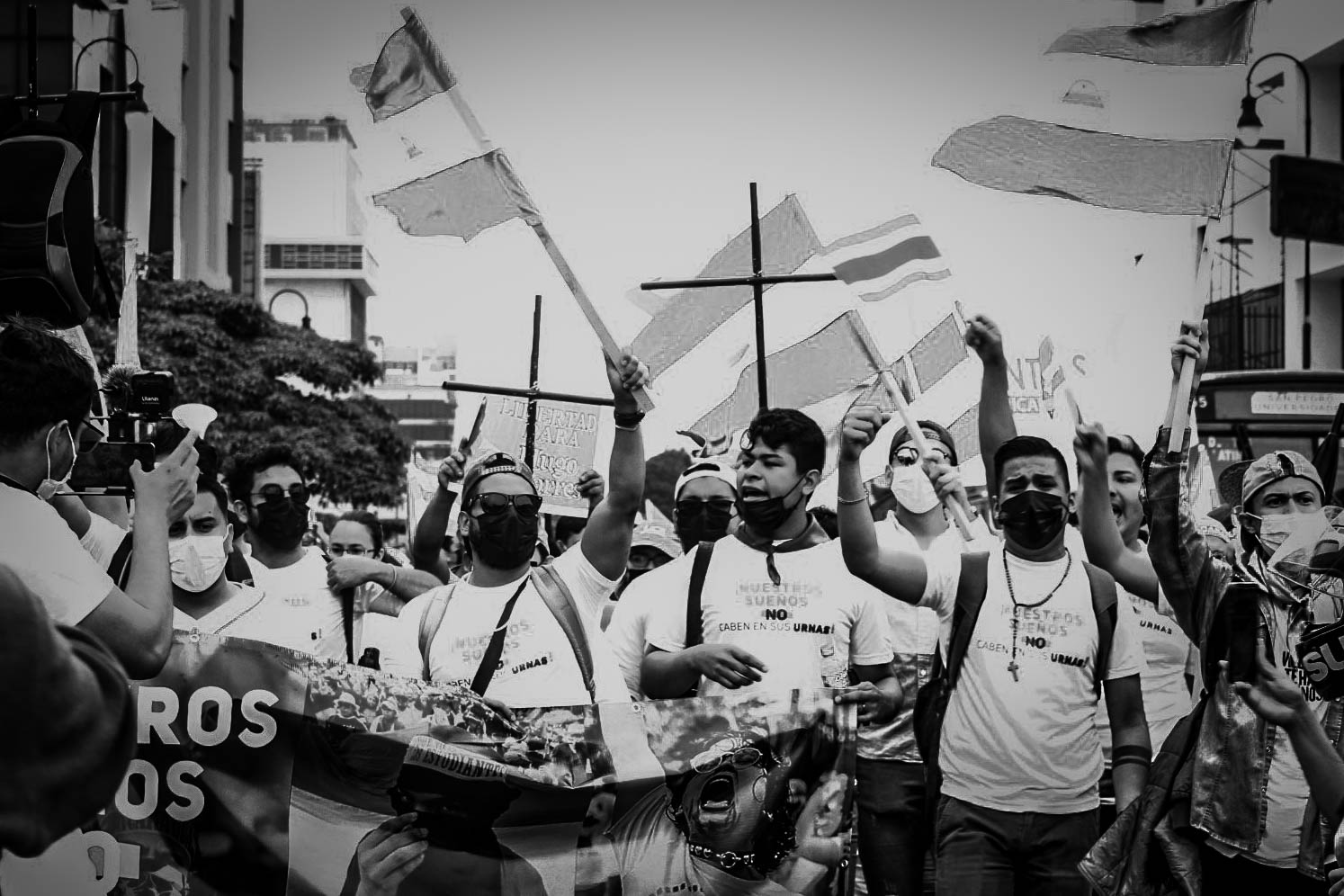Disoriented, mocked, and tired Nicaraguan youth actively and massively participated in demonstrations against social injustices and the actions of the Nicaraguan government during the crisis that began in April 2018.
At the beginning of April 2018, student youth, together with the environmental movement, called for a series of national demonstrations in response to what they considered to be government negligence in response to a fire that was destroying thousands of hectares of forest in the Indio Maíz Biological Reserve. At the same time, social security reforms were approved which would affect retirees and future pensioners. This violence enraged the young and a sense of powerlessness reigned. There was no greater feeling of pain than the sight of an elderly person being shot in the head and another being violently thrown to the ground by the police.
Institutional deterioration and authoritarian regression were already affecting the population. In this context, different sectors of youth took to the streets to demand justice, freedom and a better future for Nicaragua. Although the first people to participate in the protests were university students, it should be noted that young people from secondary schools and neighbourhoods also joined in to help protect citizens’ well-being on a local and national level.
Faced with this situation, we mobilised nationally to support the elderly whose protests were being repressed, many of us brought first aid materials to help the injured in the face of potential attacks by security forces. We barricaded ourselves in the universities, always raising our voices, we built small cobblestone walls to deflect police bullets and we prepared for the worst, even though the protests were met with unimaginable levels of state repression. It should be noted that in the face of repressive strategies, we were able to counteract, document and report using mobile phones, the Internet and social media platforms such as Facebook, Twitter and Instagram, which have been very useful to tell the truth about the human rights violations and contribute to Nicaragua’s collective memory.
As young people, we began to form organisations and take part in marches, sit-ins and other spaces. We became stronger and more organised, to such a degree that we began to include the young in political decisions and actions, seeing the example of the national dialogue and the invitation to participate in the international complaints on the crimes against humanity committed against the Nicaraguan people.
As we became involved in political actions, we critically analysed what was happening in the country and our government’s actions.
Amid the state’s persecution and criminalisation of youth due to their participation in the demonstrations, and a fear of death or imprisonment—along with the pain and mourning—many of us young people had no choice but to leave our families, our memories, even our studies, and go to another country, mainly to Costa Rica. The youth migrated most; according to studies by various NGOs, between 63 and 67% of the population that went into exile is in the age range of 16 to 30.
When we first arrived in Costa Rica, we encouraged each other and jokingly said that we were in Costa Rica “on a forced three-month holiday”, and that this “exile” would only strengthen us, because we would return to our country united and prepared.
This “forced holiday” became longer and longer, until we have now been away for three years. We have prepared ourselves in different ways, many of us are already convinced that the exile will be long and that we must make a temporary life here, while others hope to return in the not-too-distant future. Some have returned and have been imprisoned or have kept a low profile, changing their location and protecting their safety and integrity in “safe houses”.
Sometimes, the feeling of helplessness strikes again after being away from our country and seeing how the government impacts our families, leaves the country under ever more precarious conditions, and has our friends imprisoned or disappeared.
Some of us young people have projected ourselves as activists, others are positioning themselves, seeking to participate in political or strategic spaces. In this search for self-improvement and a better life, some of us have managed to study a technical or university degree, sometimes beginning from zero with a degree programme that we had already begun, or even almost finished, in Nicaragua. Some of us have abandoned our studies to survive and have dedicated ourselves to work.
Our aspirations as exiled Nicaraguan youth are numerous, but something that many of us have in common is the desire to continue denouncing the situation in our country, and to contribute to the free Nicaragua that we long for, in the hope of returning to our families.
Jhoswel Antonio Martínez
[Photo: Fransk Martínez]
This article is part of PBI Nicaragua in Costa Rica's publication “Nicaraguan voices in resistance”, a project that unites different voices from Nicaraguan exiled human rights defenders. It is a tribute to the Nicaraguan organisations and collectives that, from exile, work continuously in the defence of human rights, bringing together the voices and testimonies of those who promote this work through non-violent action and in a culture of peace.


